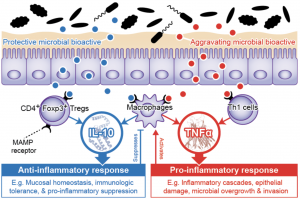
The gut microbiota – the bacteria, viruses, and other microorganisms living inside the human body – is closely linked with many health conditions, including inflammatory bowel diseases (IBD), diabetes, and colorectal cancer. However, many of the molecular mechanisms by which gut microorganisms and their biochemical products affect the immune system are not yet understood. Probiotics and other types of microbial chemicals can prevent (or exacerbate) inflammation in the gut, but to a large degree, the therapeutic potential of targeted components of the microbiome has not yet been realized.
The Human Microbial Bioactives Resource (HMBR) thus aims to provide a comprehensive platform for discovery, validation, and early-stage translation of novel therapeutics derived from the microbiome, including:
- Protocols detailing an efficient end-to-end sampling and multi’omic profiling system for the host and microbiota in gastrointestinal disease.
- Data from thousands of IBD microbiomes and tens of thousands of gut microbiome profiles, spanning dozens of datasets and meta-analyzing multiple countries, cohorts, and clinical centers.
- Prioritized potentially bioactive elements of the gut microbiome in IBD, including A) microbial species and strains, B) microbial gene products (proteins, secreted peptides, biosynthetic gene clusters, etc.), and C) small molecules (e.g. metabolites or signaling molecules).
- Screens for high-priority bioactives in vitro using mammalian cell and tissue models to characterize potential mechanisms of action and identify host-microbe-metabolite interactions.
- Phenotypic readouts (cell population, cellular function-based, and preclinical IBD models) for successful bioactives in conventional and gnotobiotic mice to assess activity in vivo.
- A unified community web portal hosting all HMBR data, protocols, computational tools, microbial isolates, compounds, cell lines, mice, screening results, and training material.
- Driving biological applications in the verification and characterization of novel modulators of the IL-10 anti-inflammatory and TNFα pro-inflammatory responses.
The HMBR represents a collaboration between the Broad Institute, the Harvard T.H. Chan School of Public Health, and the University of Maryland Institute for Genome Sciences. We’re just getting started, so please watch this space for more news, data, and updates, and please get in touch if you’d like to provide feedback or participate.
